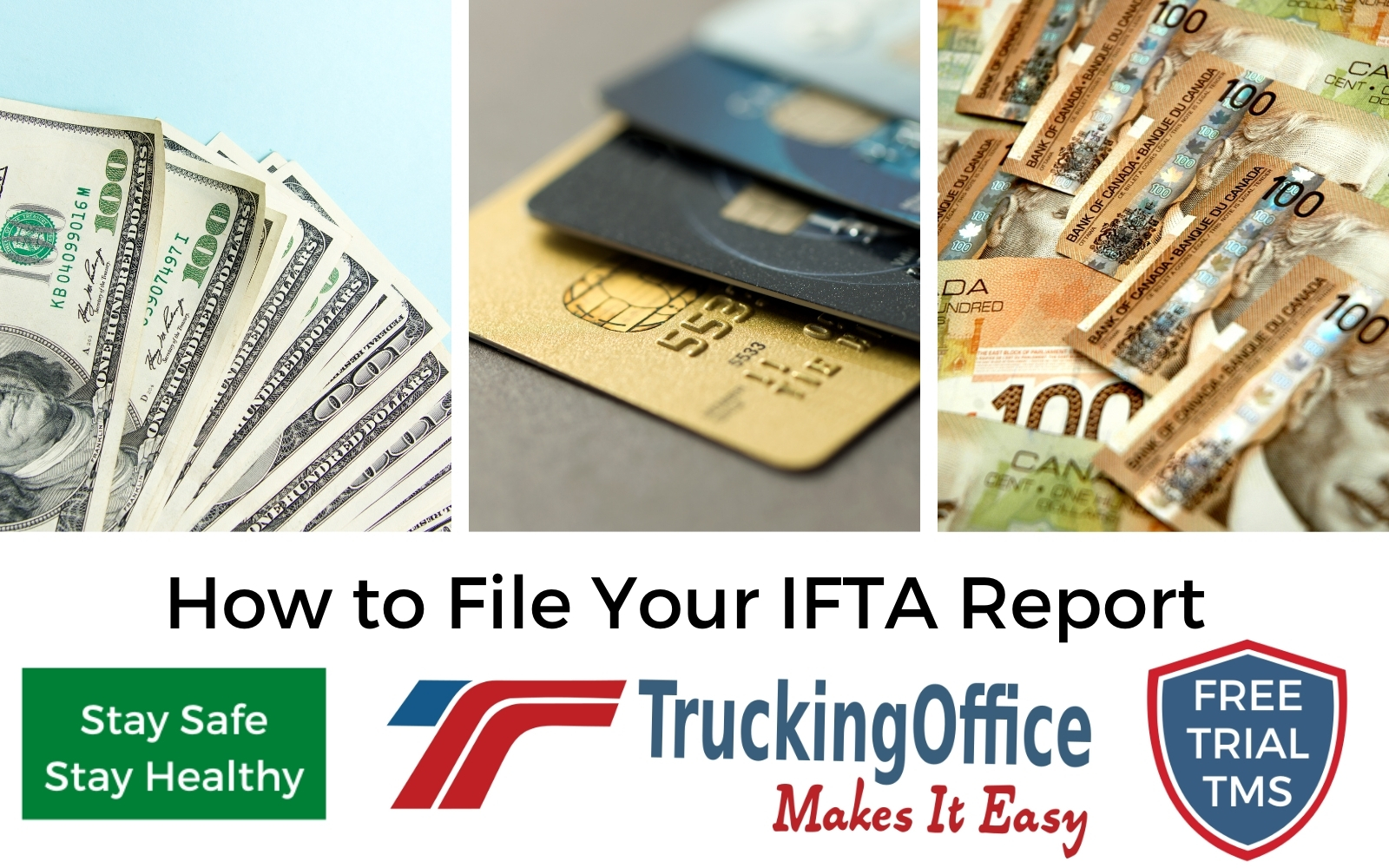Oops! Time is sneaking up on you. It’s time to submit your 3rd quarter IFTA report due by October 31st. If you’re new to the trucking industry, you’re a little nervous about this report. Or, you’re still a little unsure how to file one. So, let’s get you started. Here’s what you need, where to get it, where to file, and when.
What You Need
It’s amazing how much paperwork you generate in the process of delivering freight. But it’s also surprising that you always end up needing more. So before beginning your IFTA tax report, make sure you have everything, such as:
- Trip reports – include beginning and end dates, destination, trip origin, and routes.
- Fuel receipts – include total gallons purchased in each state, type of fuel, date, location, number of gallons, price per gallon, and the total amount.
- Mileage records – should include miles driven in each state or jurisdiction, total miles each trip, and total miles.
- Current IFTA tax rates – each state or jurisdiction has different rates, so be careful.
Where to Get IFTA Tax Rates
IFTA taxable miles are usually the same as the total miles driven in any jurisdiction. However, some jurisdictions allow mileage exemptions that aren’t taxable.
To find the current applicable tax rates for each jurisdiction, go to the IFTA’s website. You’ll find fuel tax rates by quarter and jurisdiction.
When to File IFTA Reports
IFTA reporting is done on a quarterly basis. The quarters are as follows:
- First Quarter – January through March – due on April 30
- Second Quarter – April through June – due on July 31
- Third Quarter – August through September – due on October 31
- Fourth Quarter – October through December – due on December 31
Your base jurisdiction will provide a tax return and a list of tax rates and can process the returns. Paying after the above due dates requires a late payment fee based on how long your return is overdue. Your base jurisdiction should proportionate such information.
Typically, the late fee is calculated as 10% of the amount due or $50.00, whichever is greater. Penalties for late payments begin the month after the due date. If penalized, a monthly tax charge of 0.4167% will be added to your bill until you are free of such debt. This rate also applies to underpayment of taxes due.
Online Reporting
Filing an IFTA report depends on the jurisdiction where you registered your trucking business. Every jurisdiction has its own website now. You can find the links through a search engine, or possibly the state or province has sent you the links. Keep track of this link – we’ve found that many states have updated and changed their websites in the last few years. With the IFTA program, filing this tax report has been simplified to only reporting to one location, instead of every state or jurisdiction you drove through. That was a mess.
Once you get to the website, the instructions will tell you how to file the report and make the payment, usually by credit card. You will supply the numbers: miles per state and fuel purchases. In return, they will tell you how much tax you owe.
Common Mistakes to Avoid When Filing Your IFTA Reports
You’re only human and inherently prone to making mistakes here and there. But, when it comes to IFTA filing, mistakes can be expensive. So, before you start this quarter’s IFTA report, make sure you avoid these common mistakes:
- Late filing or failure to file at all. This oversight can cost you $50, or 10% of the amount of taxes owed, whichever is more. It also puts you at risk for an audit. Remember, you must file even if you did not drive during the quarter.
- Estimating fuel use. This tactic will save some time, but will it be worth it? If your calculations are questioned, you could face an audit and risk not getting your IFTA stickers renewed on time.
- Failure to document odometer Issues. Odometer readings affect your reported mileage. So, if the readings are inaccurate due to malfunctions, be sure to note this information.
- Not logging personal miles. If gaps show up between mileage in your log from one day to the next, it can result in an audit.
- Miles-per-gallon discrepancies. When the miles-per-gallon varies significantly from previous quarters, you should provide an explanation.
Without a current IFTA sticker, you aren’t going anywhere. So, let TruckingOffice help you file accurate and timely IFTA reports.
Why Not Make IFTA Reporting Easier?
Believe it or not, there is an easier way to record mileage and fuel use, maintain proof of purchase, and file IFTA reports. No more worries about lost receipts or inaccurate information. With less paperwork to fill out by hand, you’ll gain some extra time to spend on the road.
But IFTA isn’t the only detail-oriented facet of trucking that eats up so much of your time. You also need help with invoicing, dispatching, vehicle maintenance, expenses, driver pay, and business reports. With our TruckingOffice TMS and ELD packages, you get all that and more with the most comprehensive trucking management software available, and it’s easily affordable.
Did we mention that it saves you money and helps increase revenue? Yes, our system saves money by helping you prevent costly vehicle repairs, avoid IFTA late fees or penalties, and see exactly where your money is going. With our TMS, you’ll increase revenue by having more time to drive, can plan more profitable routes, and keep those customers happy and paying.
We’re convinced about the quality of our product, so we offer you a chance to see why. Simply sign up for our free, no obligation trial. Check out all of the features of our program, especially the part about making IFTA reporting easier. You’ll be convinced, too, and we look forward to having you aboard.







Trackbacks/Pingbacks